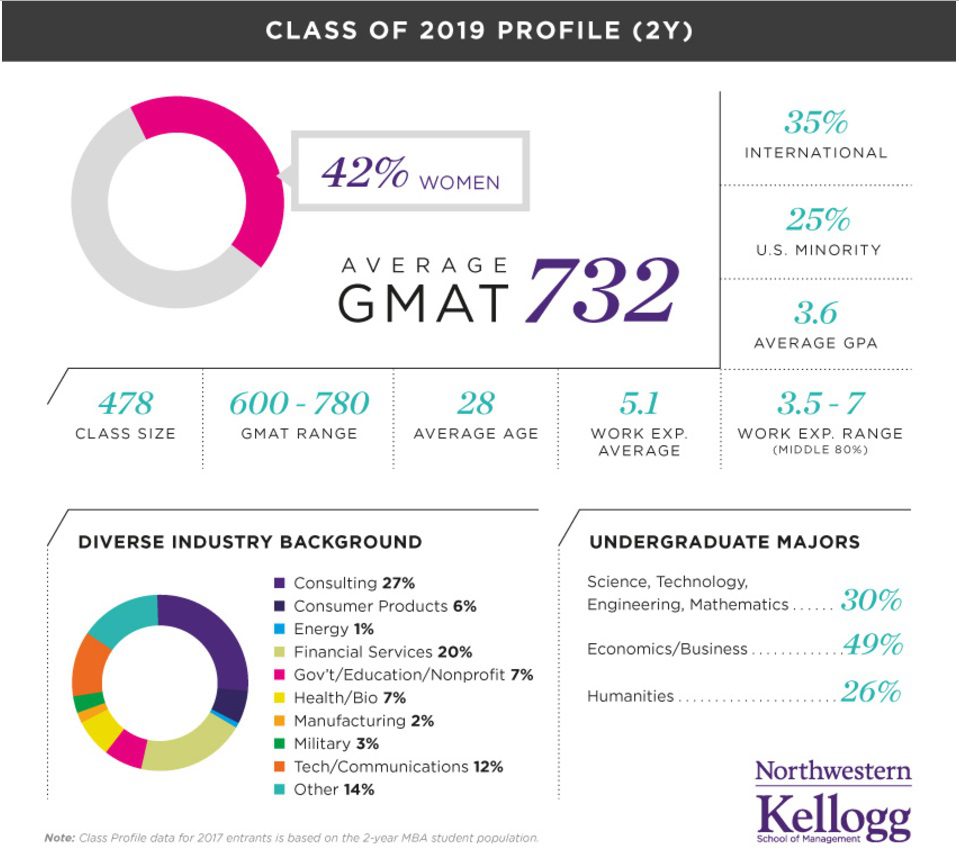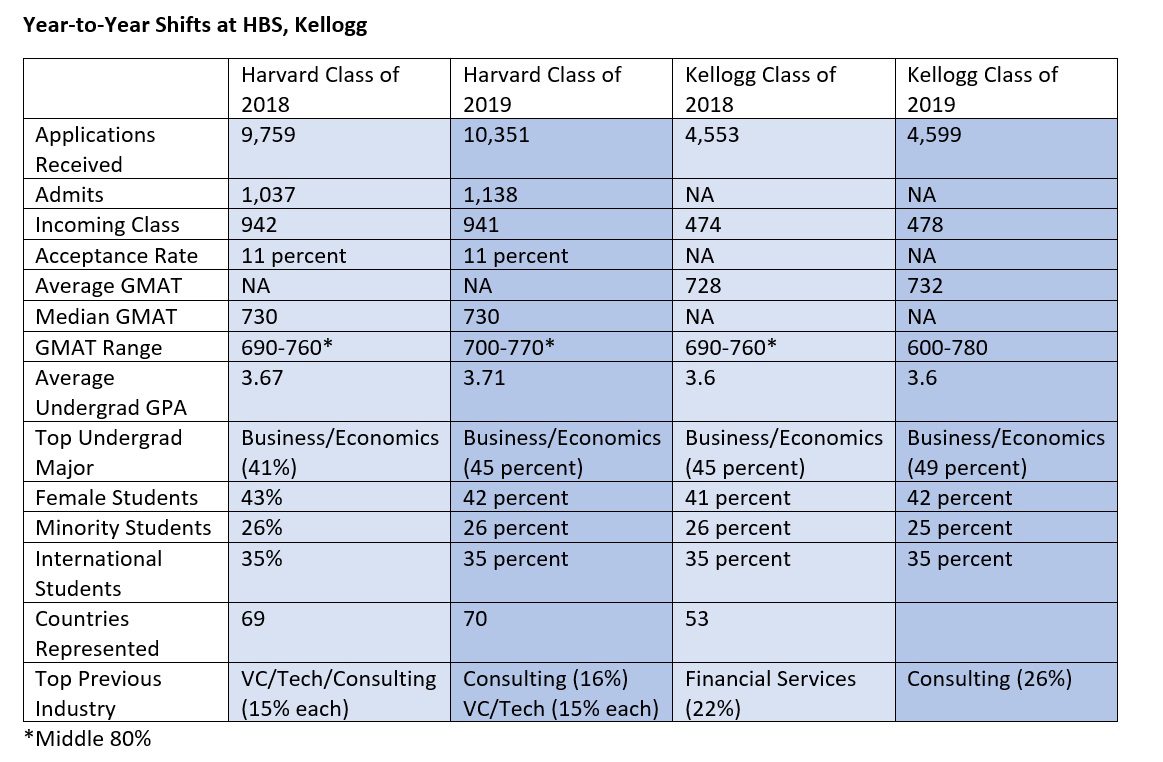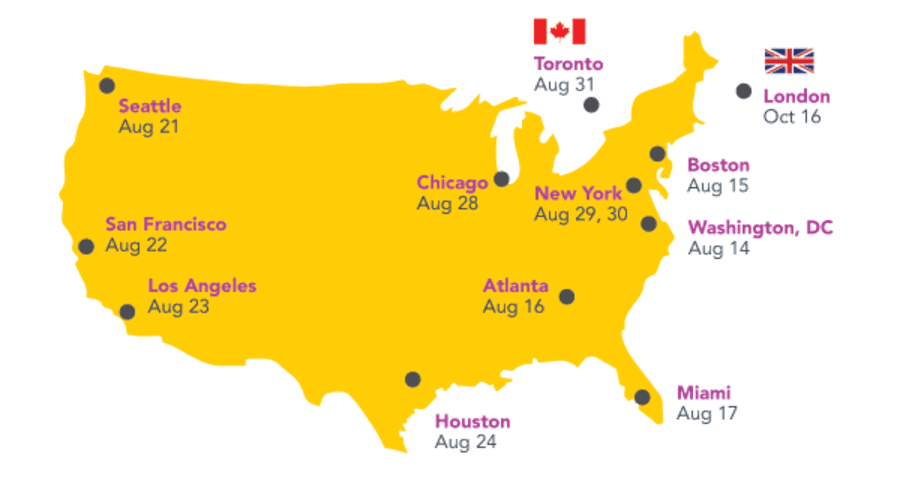The Boston vs. Washington DC Full-Time MBA Battle

Choosing the right city for your MBA program can be a bigger choice than it seems: given the connections and opportunities an MBA typically provides, the city where you pursue your degree will likely be the same city where your career begins and grows.
Even if you’ve narrowed down your business school search to the east coast, you’ve still got a number of top metros to choose from. So regardless if you’re looking south to Washington, D.C., or north to Boston, both metros will likely offer a number of benefits for up-and-coming business professionals.
Both D.C. and Boston offer a number of exceptional full-time MBA programs, giving a prospective MBA a lot to think about. Below, we’ll break down some of the biggest differences in location, programs, and job placement for each metro.
Location
As long as you can deal with snow, Boston is a multicultural hub of business that covers a variety of industries, from startups to high tech and the creative economy. Massachusetts is home to 30 Fortune 500 companies, with massive corporations like General Electric and Liberty Insurance Group centered within Boston. However, as the city continues to grow and improve, the cost of living is also climbing, with Boston ranking eight overall as the most expensive city in the United States.
If you are looking to use your business acumen in a government setting, there are few places better to go than the nation’s capital. With fifteen companies making the Fortune 500 list in the Washington DC metro area, there are a number of opportunities for MBAs to put their business skill to work, even outside of government agencies, with companies like Wal-Mart and Exxon Mobile leading the list. However, DC even outranks Boston for cost of living, ranking as the third most expensive city in the United States.
Washington Full-Time MBA Programs
The Washington DC metro has more than 35 higher education institutions with post-bachelor programs for business students. Featuring some of the top ranked MBA programs in the country, many of the DC programs focus on professional integrity and ethics, attempting to reflect its location in the country’s capital. Many of the MBA programs here also focus on placing business within a global context, encouraging students to gain real-world experience outside of the classroom to gain a better understanding of the global business community.
Full-Time MBA Programs in DC Include:
- George Mason University School of Business
- George Washington University School of Business
- Kogod School of Business – American University
- University of Maryland R.H. Smith School of Business
Boston Full-Time MBA Programs
The Boston metro features some of the top ranked and oldest business schools in the world, which focus on placing students within the global economy and encouraging study abroad opportunities that allow students to get hands-on experience in international business. Given Boston’s reputation as a growing business hub, many of the top jobs in the city may require an MBA.
Full-Time MBA Programs in Boston include:
- Sloan School of Management – MIT
- Harvard Business School
- Questrom School of Business – Boston University
- Sawyer Business School – Suffolk University
- Carroll School of Management – Boston College
Cost of MBA Programs
Cost can be an important consideration when choosing a degree program. The average tuition costs of the Washington DC programs mentioned above is roughly $82,090, though the number may be slightly less for local students. In Boston, the range may be slightly higher. Harvard Business School can cost up to $122,000 per year, but other quality programs in the Boston metro can also be found as low as $91,040.
Job Placement and Salary
The cost one is willing to spend on an MBA is often largely determined by the potential salary that can be made after obtaining the degree. Given that both Boston and DC are among the U.S. cities with the highest cost of living, salary may be an important determination in selecting a city to start your career. Thankfully, both cities offer the chance for high earning potential. According to PayScale, Boston MBA graduates can earn anywhere from $53,725 on average to $173,940. In Washington DC, where there is a slightly higher cost of living, salaries can range from $58,402 to $147,715.
Part-Time MBA Programs: New York City vs. Boston

Part-time MBAs offer an abundance of perks: more flexibility, online courses, and even weekend and evening classes. They open the door for professionals who want an MBA but might also have children or a full-time job or other responsibilities that take priority.
If looking at the East Coast, two cities may come to mind: New York City and Boston. Both are drastically different metros just by the size alone. New York City is home to more than eight million people. Boston is nearly 675,000. That’s a big difference.
But both places have plenty to offer. It just comes down to what a person is looking for.
Here is the quick version for both cities:
-
- New York City: The city’s part-time programs cater to candidates interested in pragmatic skills like math or finance. They’re also very flexible. Being that it’s New York City, students tend to be more diverse, coming from different countries and backgrounds.
- Boston: Schools definitely offer advantages for candidates who already hold a professional certification like a CPA or CFA. Classes are dramatically smaller than those in New York. Surprisingly, some tuition is more costly than in New York City, but living in Boston is more affordable. Programs also seem to focus on international skills.
New York City
New York City is one of the greatest cities in the world. This is true when it comes to culture, business, networking, and all of the above. People from all around the world frequent this city. The city has its quirks, of course. The public transit system is in a state of emergency. During the summer, it’s not uncommon to find putrid smells sneaking into your nostrils. And there are, of course, the pests and rodents.
But all of this is worth it to the many transplants who move to New York City. After all, the city does hold the title of the world’s second largest metropolitan economy, following Tokyo—a city with a significantly larger population. More than three million of the city’s residents are foreign-born, which is a perk for someone who wants to break into the international sector. New York City really is a magnificent place if you’re looking for vibrancy and a taste of the world beyond the U.S. may look like. It’s a global city.
These schools offer part-time MBAs around New York City:
-
- Lubin School of Business – Pace University
- Rutgers Business School, Newark and New Brunswick (New Jersey)
- Stern School of Business – New York University
- Tobin College of Business – St. John’s University
- Zicklin School of Business – Baruch College
Every school offers its unique set of courses and perks. St. John’s University’s Tobin College of Business has classes during the evenings and weekends. Its curriculum is straightforward: Take 54 credits with a maximum of 36 going toward your concentration.
For NYU Stern, there’s a bit more flexibility. Students can take up to six years completing their MBA if they need. If just the weekends are ideal, candidates are limited to two concentrations: finance and management. The campus is diverse with 34 percent of students female and 24 percent people of color.
The Lubin School of Business offers classes at all times of the day and week. The school offers concentrations in international business and international finance, a benefit to any student wanting to take their work global. It requires that three credits outside a student’s concentration be in international business, so the program definitely leans toward teaching competitive skills for an international market.
The Rutgers Business School is a little far out with its campuses in New Jersey. However, that’s a short ride from New York City (and the cost of living is cheaper in New Jersey, too). The school’s part-time program doesn’t stray too far from its full-time one. It includes an interactive course requirement and makes sure that its students walk away with a working knowledge of statistics and calculus. Math will come in handy when handling business.
The Zicklin School of Business at Baruch College allows students interested to pursue their JD/MBA in partnership with Brooklyn Law School or New York Law School. Accountancy majors can also obtain a CPA with their MBA.
Boston
Boston is like a little piece of Europe in New England. Perhaps that’s why Boston sits at the heart of the region. Its cobblestone sidewalks and streets are an ever-present reminder of the region’s history. While it is certainly not as bustling as New York City, it doesn’t mean it’s quiet. Boston is always booming with tourists on the hunt for the perfect lobster roll or college students traversing their way to class. It’s also culturally diverse with most of its population non-white.
The city doesn’t see the musty summers that New York does, but it does see some severe winters. If snow’s your thing, that’s a perk. If it’s not, well, tough luck. The city does, however, rank among the highest concentrations of employment, so a graduate is sure to find a job in the area. Unlike New York, Boston has already invested in its public transit infrastructure to ensure that residents can get around easily.
Then again, that means parking and driving in the city sucks. You can’t have it all.
These schools offer part-time MBAs around Boston:
-
- Carroll School of Management – Boston College
- D’Amore-McKim School of Business – Northeastern University
- Sawyer Business School – Suffolk University
At Northeastern University, flexibility is a strong suit. The program starts in September and January of each year, but students can take as long as they need to complete the program. The D’Amore-McKim School of Business gives students the option to take part in an international field study, which last one to two weeks.
The Carroll School of Management at Boston College gives online and hybrid courses. The school is big on experiential learning, so it does a great job of exposing students to real-world professionals. If a student already holds a CFA or CPA, they are eligible for advanced standing. Like many other Boston schools, the Carroll School is big on expanding students’ experiences beyond Boston. They take TechTreks to nearby New York City or even Seattle. But that doesn’t exempt students from the mandatory 20 hours of community service.
The Sawyer Business School offers a part-time MBA that can be completed in 10 months. That’s shorter than some full-time MBA programs. There’s a summer option, too, for anyone who’s in a rush to graduate. From the beginning, candidates must plan for their career with their first semester including a one-credit business simulation course. The program also has a three-credit global requirement. Students have gone on to China and Brazil in the past for a week-long global travel seminar.
Searching for the Perfect 1-Year MBA in Boston

Not everyone has two years to dedicate toward earning an MBA. For some, maybe a year is just a better option. Luckily, Boston has more than enough options for those who would rather trek down the one-year path.
Currently, Boston is the 20th most populous city in the U.S., with its historical roots grounded in advanced academia. It has proven to be a perfect home for students, with a population that skews young. Almost one out of every three residents is between the ages of 20 and 34.
The largest employers might be hospitals like Brigham & Women’s Hospital or Massachusetts General Hospital, but the coastal city’s true jewels are its universities like Harvard and MIT. While most schools in the area offer MBA programs, not all offer options that’ll allow students to graduate with an MBA within one year. Below, we outlined some of the best Boston 1 Year MBA program opportunities.
F.W. Olin Graduate School of Business — Babson College
The F.W. Olin Graduate School of Business isn’t too old; it’s been around since 1947. Students can take its one-year MBA program on its main campus in Wellesley, Massachusetts. It’s about 14 miles away from Boston, so students will still be just a short drive away.
The program takes 12 months, but students can build close bonds with each other in this short period of time. This program’s participants operate as a cohort, but they also get the chance to mingle with some students in the school’s two-year and evening MBA programs. All MBA candidates have the opportunity to participate in Signature Learning Experiences, a hands-on approach to education that prepares students for real-world situations.
Sawyer Business School — Suffolk University
The Sawyer Business School isn’t as old as the university, but that hasn’t stopped it from getting recognized. The school began to offer an MBA in 1948 and never quite began to offer a formal one-year MBA program, but it does offer accelerated ones.
Sawyer has a couple accelerated MBA programs: one for attorneys and for certified public accountants. The way it works is that students enter the program with credits already under their wing. The catch is that students complete a certain number of credits in the business school—but these could have been before chasing an MBA. It all really depends. That’s 37 credits for attorneys; 34 for CPAs.
MBA candidates with an interest in law can also learn a concentration while at the school. Courses include an immersive, travel seminar. As for CPA candidates, their curriculum is nearly identical to the attorney pathway. The only difference is one class required for the attorney curriculum and not the CPA: Corporate Financial Reporting and Control.
Sloan School of Management — MIT
MIT may mostly be known for tech industry and Good Will Hunting scenes, but its Sloan School of Management is frequently ranked as one of the best in the world by esteemed publications like The Economist. While Sloan doesn’t exactly offer a one-year MBA, its MIT Sloan Fellows Program only takes one year—and fellows walk away with an MBA.
The school calls the program a “change-the-world toolkit.” Mid-career managers from around the world are invited to apply for the fellowship. Once accepted, fellows arrive in April and begin their journey together. They take summer courses, fall courses, and some during the spring too. There’s an optional independent activities period where fellows can take part in a four-week term made up of how-to sessions, forums, or tours for 12 credits max.
What MBA Class of 2019 Profiles from HBS, Kellogg Reveal about YOUR Admission Chances

Northwestern’s Kellogg School of Management last week released a profile of its incoming Class of 2019, and Harvard Business School (HBS) earlier this summer released its own preliminary Class of 2019 profile. (The Boston school notes there could be subtle shifts come late August when the final class matriculates.) A look at both reveals that this past admissions cycle was a competitive one with few major shifts from the year before. It also shows some striking similarities between the incoming class compositions at the two schools.
Application Volume Increases
HBS clearly outperformed Kellogg in terms of application volume. At HBS, applications rose from 9,759 in 2015-2016 to 10,351 in 2016-2017, a 6 percent increase. The school maintained its stringent 11 percent acceptance rate, second only to Stanford’s, which has historically hovered around the 6-percent mark. Total enrollment this year is 941, down from 942 last year. According to the school, yield this year was 91 percent, which means more than nine of 10 accepted students decided to enroll.
At Kellogg, applications rose a more modest 1 percent over last year. Melissa Rapp, Kellogg Director of Admissions, characterized application volume as “steady” in an interview with Clear Admit earlier this summer. The single percentage point increase included slight upticks in domestic applicants as well as those from some international markets, which offset declines in applicants from other international markets, she says. Applications totaled 4,553 last year, which puts this year’s number closer to 4,600. Overall, 478 students comprise the incoming class, up from 474 in the Class of 2019.
Kellogg Continues Its GMAT Ascent
But where GMAT scores are concerned, Kellogg outshone HBS. HBS reported a median GMAT score of 730—identical to the two prior years. HBS does not share average GMAT score data, but it does reveal that the middle 80 percent of the class submitted scores between 700 and 770.
Kellogg, which shares average GMAT score, saw this metric rise another four points over last year, to 732. It’s the continuation of a multi-year increase for the Evanston school that just five years ago had an average GMAT score of 708. Its meteoric rise places it second only to Stanford Graduate School of Business where this metric is concerned, barring significant jumps at other schools that have not yet reported average scores for the incoming class. (Stanford GSB doesn’t release its incoming class profile until later in the fall, but last year’s average GMAT score was 737.) Kellogg’s overall GMAT score range was between 600 and 780. Last year, the range was 690 to 760—but last year’s data only reflects the middle 80 percent range, before Kellogg started reporting full range.

Undergraduate GPA, Major
In terms of average undergraduate GPA, HBS saw slight gains over last year, up to 3.71 from 3.67. At Kellogg, average GPA stayed the same as last year, at 3.6. As for what applicants studied while in college, both schools showed a greater preference for business backgrounds this year than last. At HBS, 45 percent of the incoming class majored in business or economics, up from 41 percent the year before. STEM majors were next, at 36 percent, with humanities majors bringing up the rear at just 19 percent. (Last year, STEM majors accounted for 38 percent, humanities majors, 21 percent.) At Kellogg, 49 percent of this year’s incoming class majored in business or economics, up from 45 percent of the previous class. STEM majors, meanwhile, made up 30 percent (up from 29 percent the year before), and humanities majors rounded out the class, at 26 percent (compared to 28 percent last year).
Class Diversity Similar at Both Schools
In terms of class diversity, both Kellogg and HBS will welcome incoming classes that are 42 percent women, down slightly from 43 percent at HBS and up slightly from 41 percent at Kellogg. Forty-three percent has thus far proven the high-water mark at both institutions.
At HBS, 35 percent of the class is international, and 26 percent belongs to U.S. ethnic minorities—mirroring last year’s stats. Kellogg’s incoming class is also 35 percent international, though U.S. minorities are 25 percent, a percentage point decline since last year. Still, Kellogg notes that this year’s class is among the school’s most diverse ever.
At HBS, the incoming class counts students from 70 countries, though 69 percent of students are from North America and 65 percent are from the United States. Students from Asia make up 14 percent of the class, with Europeans comprising another 10 percent. Student from Central and South America make up another 4 percent of the class, and 2 percent—or 16 students—hail from Africa.
Varied Professional Experience
Both schools tout the varied professional experience represented by the incoming class. At HBS, those from a consulting background make up 16 percent of the class, followed closely by venture capital and private equity, which each comprise another 15 percent. The financial services category makes up 11 percent, followed by government/education/nonprofit, healthcare/biotech, and other services (each at 7 percent); consumer products and energy (6 percent each), and finally manufacturing and military (each at 5 percent). HBS shared that the average age of those in the incoming class is 27, though no details about average years of work experience were made available.
HBS Touts Its Diversity in Video Entitled “Mosaic of Perspectives”
Kellogg, meanwhile, shows a greater predilection toward applicants from a consulting background, who make up 27 percent of this year’s incoming class. Applicants who have worked in financial services follow, at 20 percent; “other” makes up 14 percent, and those from a tech/communications background make up 12 percent. Other less represented backgrounds include government/education/nonprofit and healthcare/bio (each 7 percent), consumer products (6 percent), military (3 percent), manufacturing (2 percent), and energy (1 percent). Average work experience at Kellogg this year is 5.1 years, with 80 percent of the class having between 3.5 and 7 years. The average age of the incoming class is 28.
Rapp expressed great enthusiasm about both the diversity and high quality of the group of students who are just now arriving on campus, noting that theirs will be the first class that will get to enjoy Kellogg’s gorgeous new Global Hub for their entire time in business school. “As we do every year, we looked for leaders that are focused on collaborating to create impact and lasting value wherever they go—before Kellogg, during their time at Kellogg, and in the future,” she said. “Our comprehensive approach to admissions enables us to attract an incredibly well-rounded group of students to Kellogg. The quality of the applicant pool has increased this year, and the quality of our accepted students is commensurate with that.”
Chad Losee, HBS managing director of MBA admissions and financial aid, shared fewer words but no less enthusiasm. “So hard to capture the talent and diversity of perspectives in this group. They are amazing!” he wrote on his Director’s Blog.

This article has been edited and republished with permissions from Clear Admit.
2017 Forté Forums Scheduled in 12 Cities Beginning August 14

It’s August, which means it’s almost time for the Forté Forums. These free events are hosted by the Forté Foundation, a nonprofit consortium of leading companies and top business schools committed to advancing the role of women in business. Scheduled for 10 U.S. cities as well as Toronto and London beginning on August 14, they are designed to help women learn more about the value of the MBA.
Whether you are a college student looking to explore options for the future, have been in your job for a few years and are thinking about a change, or are looking for a way to catapult yourself to the next level in your career, the Forté Forums are for you.
Choose to attend a forum in a city near you, and you can learn more about how the MBA can help you advance in your career, expand your earning potential, or provide opportunities to study abroad. With more than 100 leading business schools in attendance, you can also learn more about different programs directly from the school representatives who know them best.

The Forté Forums also draw leading MBA businesswomen from a range of industries and career stages, eager to share their experiences and provide advice and guidance. And they give you a chance to network with other high-achieving women interested in learning more about the MBA. Former attendees of the Forté Forums report that women they’ve met at the events have become part of a lasting peer support network.
Last but not least, the forums can help you begin to think about how to finance your MBA, offering valuable information about Forté’s scholarship opportunities, as well as many other funding sources.
Whether you know nothing at all about business school and want to see what it’s all about—or you’re planning to apply this fall and want to connect with others doing the same, don’t miss out. Register for a nearby Forté Forum today!
2017 Forté Forums Calendar:
August 14th: Washington, DC
August 15th: Boston
August 16th: Atlanta
August 17th: Miami
August 21st: Seattle
August 22nd: San Francisco
August 23rd: Los Angeles
August 24th: Houston
August 28th: Chicago
August 29th and 30th: New York City
August 31st: Toronto
October 16th: London
Learn more about the Forté Forums, including how to register.
This article has been edited and republished with permissions from Clear Admit.
MIT Sloan Hosts 6 Women’s Week Events for Female MBA Candidates

At MIT Sloan School of Management, advancing women in leadership is a core commitment. For starters, the student-led group MIT Sloan Women in Management offers female MBA students a range of opportunities to help propel their careers. Sloan also puts on an annual Women’s Week to showcase for prospective female applicants what the Sloan MBA student experience is like and the many paths its accomplished alumnae pursue. Continue reading…
